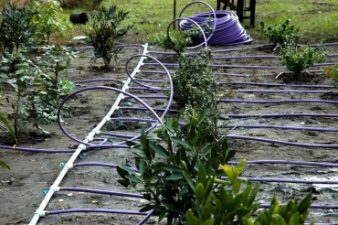 A bee farmer points to queen bee in active hive; via Day in the Country bee center
A bee farmer points to queen bee in active hive; via Day in the Country bee center
Back in 2008, we reported about an Israeli research company Beeologics that believed it had discovered what might be a cure for a serious bee syndrome known as Colony Collapse Disorder (CCD). Agricultural experts say that CCD is responsible for a serious decrease in the number of bee colonies or apiaries all over the world, including Israel and Lebanon.
Besides CCD, many other factors have also been said to contribute to bee colony demise, including climate change that destroys the pollen or food the bees feed on, overuse of pesticides and herbicides, and even microwave transmissions from cell phone towers that many say “confuse” bees and make them lose their homing ability to return to their hives.
 A bee pollinates almond blossoms; via Yosi Slavetsky, Israel Min. of Agriculture
A bee pollinates almond blossoms; via Yosi Slavetsky, Israel Min. of Agriculture
Now, more than 4 years later, not much improvement has occurred since Beeologic’s discovery of the drug they refer to as remembee. Mr. Hertzel Avidor, head of the Israel Honey Council, says that Beeologics is conducting tests on bee hives using this drug to determine if it can help solve the problem of CCD.
Says Mr. Avidor:
We don’t really know what the real cause of CCD is, except that it may be caused by a virus or other problem. The exact cause has not been discovered yet. The virus called IAPV and also referred as the “Israeli One,” due to being discovered by researchers here in Israel, could also be connected to a problem with the bee’s DNA that has been affected by use of pesticides and various forms of pollution.
The decline in bee colonies and honey production is a complex one and cannot be pinned to a single cause. Nitzan Paldi, a technical researcher for Beeologics, says that many factors are involved including parasitic mites such as the varroa mite, a growing human population and possibly climate-change.
Paldi believes that climatic factors have great effect on bee populations in Israel and neighboring countries. He says that in general, the long, hot and dry summers found in this region do not bode well for honey production and that places like Europe, US, Canada, New-Zealand etc. have wet summers with a long period of flowering throughout summer.”
Due to this, these countries have yields of honey that Israeli and other eastern Mediterranean beekeepers can only dream of.”
Notwithstanding, he believes that Israeli beekeepers are very proficient at taking full advantage of the resources and maximizing their yield. He adds that Palestinian farmers in the West Bank often keep bees as well and that some of the traditional beekeeping methods in their villages are akin to methods that have been uncovered in archaeological digs from 3000 years ago.
Due to all of these issues, annual honey production in Israel, where great effort is being made to save bee populations, has nevertheless fallen from around 40 kg per hive to only 20 kg – a decrease of 50%. In general, Beeologic’s Nitzan Paldi believes that more needs to be done by humans to save the world’s bees.
“In various geographies, any one of several factors, including overuse of pesticides and herbicides, climate change, and loss of bee habitats due to over-development by humans can be the main contributing factor; with others being minor,” he said. “Moreover, this can change over time for the same given location. In general, we can say that the growing human population and its impact on the planet are such that we need to be very cautious in our husbandry of the planet.”
Read more on regional bee issues and beekeeping:
Lebanon’s Bees Are Freezing to Death
Balyou: Turkey’s First Honey Tasting Tour
Green Prophet Visits Beehives Going Back to Ancient Roots
Israeli Company Discovers Cure for Bee Colony Collapse




The human factor is an important element as it also deals with loss of habitat and the plants and trees bees “feed” on (i.e. pollinate).
Another very serious factor are the mites and other natural bee enemies, especially the varroa mite. The service bees perform to benefit life on this planet has been taken for granted far too long; and now we are seeing the consequences.
Only the safe recycling of all human-generated waste materials and peaceful family planning to reduce the human population can save the bees from extinction. But I see no movement in that direction, instead the opposite. Almost everyone wants to grow the economy and that requires a growing human population in which maximum profit is obtained by minimizing costs such as safe recycling. So, wastes are dumped so millionaires can become billionaires, which means the bees will likely go extinct, along with the rest of life on Earth, including humans.